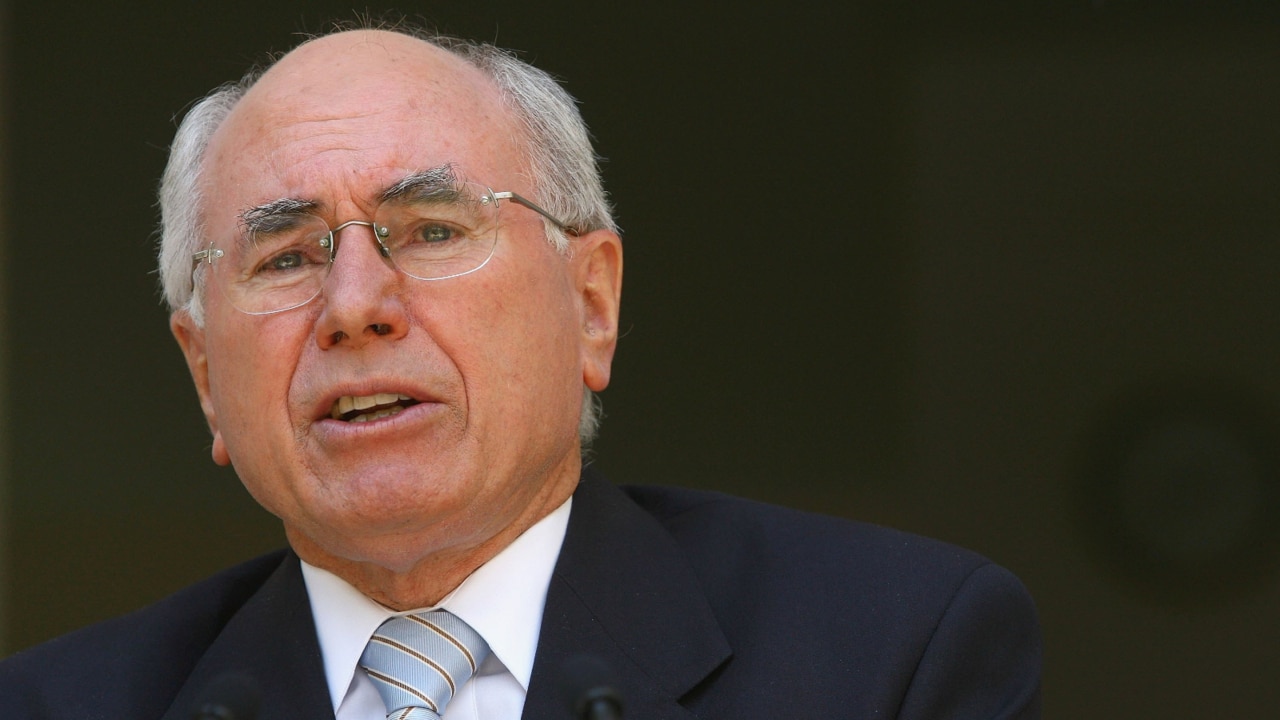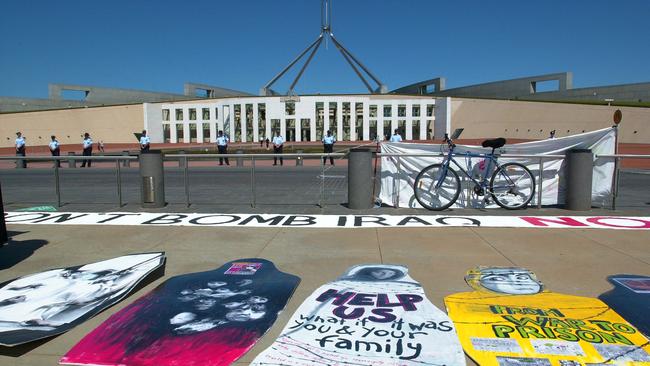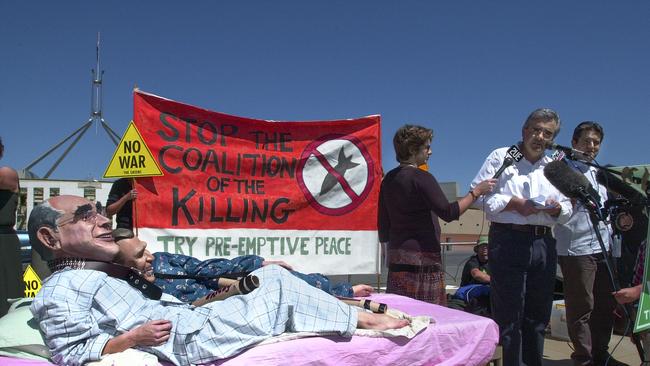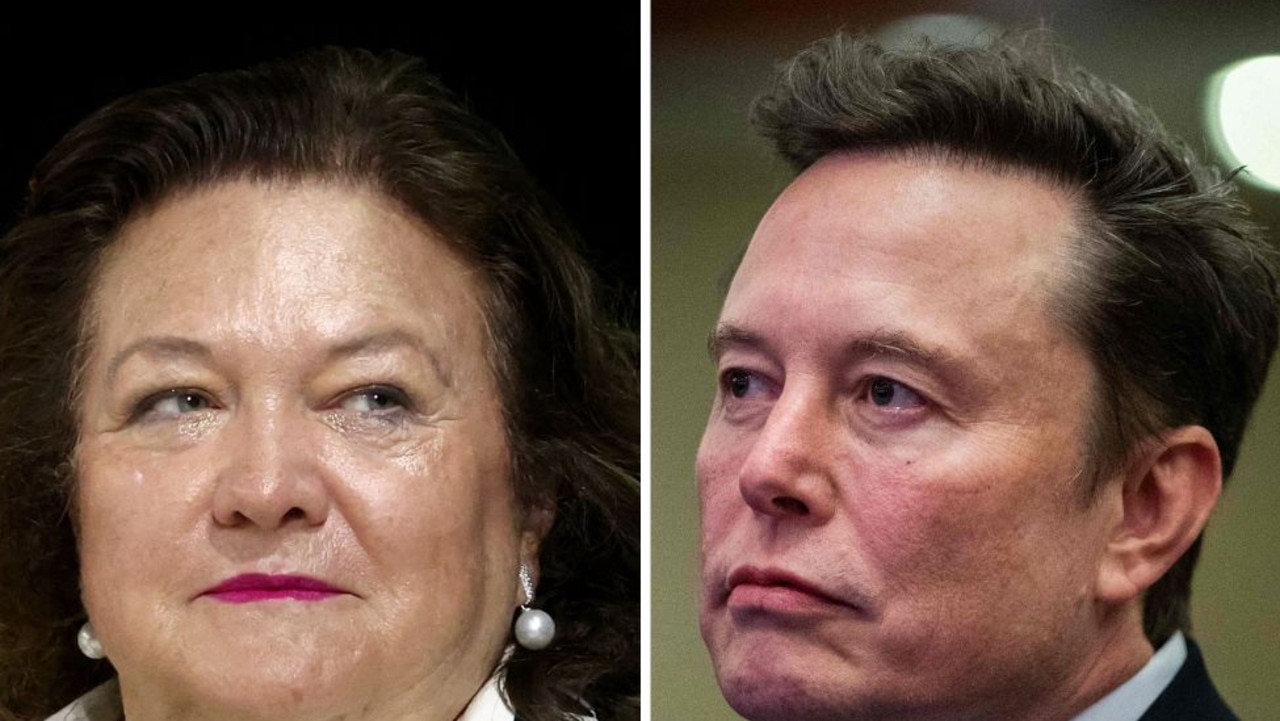New 2003 Howard cabinet documents reveal Iraq admission
A previously secret set of documents has revealed what the Howard government considered in the days before – and after – the Iraq war began.

Leaders
Don't miss out on the headlines from Leaders. Followed categories will be added to My News.
Australia was advised two weeks before the Iraq war began that the United States was likely to invade even if the United Nations did not authorise military action, newly released cabinet documents reveal.
The documents also make clear that before the war began, the Howard government did not foresee Australia contributing to peacekeeping or reconstruction efforts in Iraq after the initial conflict.
The National Archives of Australia on Thursday published a tranche of previously-secret documents surrounding the Howard government’s decision making process before and after war began on March 20.
The documents were not released on January 1 this year, like the rest of the 2003 cabinet files, because they were misplaced and not initially handed over to the NAA in 2020 by the Morrison government.
A review found there was no political interference, and that administrative error and “internal systemic issues” were to blame for 82 cabinet records not being handed over.
The latest tranche of 14 files includes 13 National Security Committee documents.

Two weeks before the war began, the committee was informed on March 5 the US would likely invade Iraq even if the UN security council did not pass the resolution specifically authorising military action.
Such a resolution never passed, and the UN’s then secretary general Kofi Annan later described the US-led war on Iraq as “illegal” under international law because of the lack of sanctioning.
On March 5, 2003, the national security committee received oral briefings from then-foreign minister Alexander Downer and the heads of DFAT and the Office of National Assessments on the efforts to adopt a draft new resolution on Iraq.
“Whatever the outcome in the UN Security Council on the draft resolution, the United States is likely to press forward with plans to lead a coalition in enforcement actions against Iraq, given that country’s failure to comply fully with UN Security Council obligations,” the document noted.
The committee was clearly conscious that the US could undermine the work of the UN.
The committee agreed that Australia should “promote a strong and visible UN involvement in the post-conflict management of Iraq, noting the US currently sees the UN as playing a subsidiary role, and as a consequence immediate progress towards this goal is likely to be limited”.
Cabinet also agreed on March 5 that Australia would not supply ADF personnel for peacekeeping efforts, after the initial military efforts.
“We seek to minimise our role in the rehabilitation of Iraq’s internal security and law enforcement sectors, noting our extensive commitments in these areas, including in relation to the war on terrorism, in Southeast Asia,” the memo said.
“The committee also agreed that Australia would not provide ADF forces for any post-conflict peace keeping force in Iraq.”
Australian forces remained in Iraq until 2009.

Two days before the war began, cabinet ministers were asked on March 18 to agree to commit ADF resources to the US-led coalition “to enforce Iraq’s compliance with international obligations and restore peace and security in the region”.
At that stage, the government had not received any formal requests for support, but noted there was a likely “desirable, even inevitable, outcome of military action”.
A memorandum of understanding was circulated in the cabinet room from senior public servants in the Attorney-Generals department and DFAT, who had been asked to consider whether a deployment of Australian forces to Iraq and subsequent military actions would be consistent with Australia’s obligations under international law law.
“The short answer is ‘yes’,” they wrote.
In the first few days after the war began on March 20, the national security committee were receiving daily updates on military operations and intelligence.
Other documents from the early days of the invasions stressed Australia’s involvement was driven out of concern about Iraq’s weapons of mass destruction program.
Five days into the war, then-foreign affairs minister Alexander Downer made a cabinet submission, encouraging the US to “involve the UN as soon as possible” in the disarmament of Iraq’s weapons of mass destruction.
In his submission, he said Australia continued to “dampen” any expectation of a post-conflict Australia military presence, but noted on background it was “disappointing” that the US had made it clear Iraq would not be administered by an interim UN administration, but instead by an interim US military administration.
“This is disappointing, but we have to take it as a given, and seek to build a practical UN presence around it,” he wrote.

As the war effort raged on and the coalition turned their minds to post-conflict, a cabinet document from May 28 revealed the National Security Committee was focused on Iraqi reconstruction driven by a “desire to achieve a stable and economically sustainable Iraq” and take a “sensitive approach” on Iraq debt issues.
By October, cabinet was considering reducing ADF presence in Iraq.
Then-defence minister Robert Hill put to cabinet on October 15 ideas about how to start withdrawing or reducing Australia’s commitment.
The background note made specific mention to the “benefit” the Australia’s involvement in the coalition had delivered the US-Australia alliance.
“It remains in Australia’s interest that the coalition succeeds,” it noted.
The national security committee ultimately agreed that the strategy for adjusting the ADF presence in the Middle East aim to ensure “no significant reduction” in the overall number of approximately 880 personnel.
The ADF remained actively engaged in reconstruction and rehabilitation work in Iraq with a 1400-strong force in 2006. It did not begin to reduce its forces until mid-2008, before ceasing operations in 2009.
Originally published as New 2003 Howard cabinet documents reveal Iraq admission




